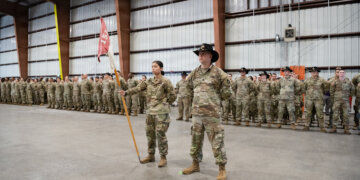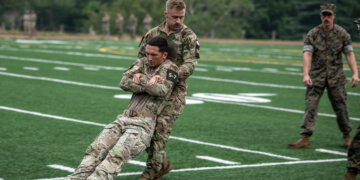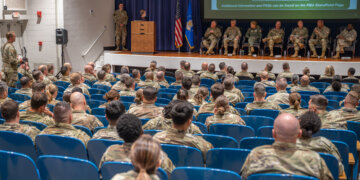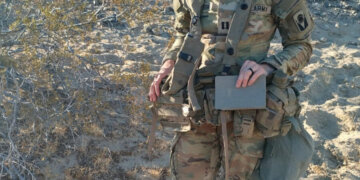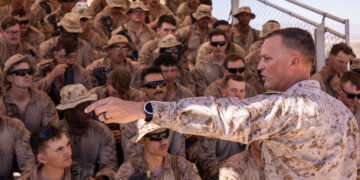NORTH LITTLE ROCK, Ark. — Featuring operational technology as a means of cybersecurity defense and including international state partners are significant differences to the National Guard’s annual Cyber Shield exercise, according to one Army colonel.
“So a couple of the big differences this year is obviously the first one you see sitting on the panel here,” said Army Col. Jeffrey Fleming, the officer in charge of the exercise, during a media roundtable held Tuesday morning. “This is the first time in a long time since we’ve had our international partners sitting on ‘Blue Teams’ with their respective state partners. And so that was a big focus.”
The Cyber Shield development and training event began June 4 at the Army National Guard Professional Education Center on Camp Joseph T. Robinson Maneuver Training Center, North Little Rock, Arkansas, and runs through June 16. It comprises more than 900 National Guard soldiers and airmen, along with partners from other government agencies and the private sector. This year’s focus is on attacks on U.S. transportation infrastructure.
The 2023 Cyber Shield marks the first time member countries from five State Partnership Programs are joining National Guard cyber teams for the exercise. The SPP programs represented – Poland/Illinois, Kosovo/Iowa, Armenia/Kansas and Moldova/North Carolina – all are Eastern Europe nations situated in a geopolitical hot zone.
RELATED: Cyber Shield 2022 focuses on safeguarding DOD Information Network
“I would like to highlight also the importance of the State Partnership Program, especially on [a] cyber-related field,” said Maj. Marcin Barszcz, a cyber analyst in the Polish Cyber Command. “This bilateral collaboration is beneficial to both sides, I believe, and strengthen our relations, which are crucial in the cyber security efforts and struggles we have on daily basis.”
OR-6 Staff Sgt. Selim Jashari, of the Kosovo Security Forces’ Cyber Defense Unit, said being at Cyber Shield was of “huge importance” for his forces.
“And let me just mention, like 2014, when we started cooperating in this realm of cyber security, we were, let’s say, ignorant of [the] cyber frontier,” Jashari said. “… but now we have a cyber defense unit and also all the capacities and human capacities in technology. And with all this culminating with us being here, which is a great thing, and now, hopefully this is not the last time we are here.”
Operational technology in relation to the protection of U.S. infrastructure was an added feature to this year’s Cyber Shield exercise.
“We’re getting back towards that, which is different from information technology,” Fleming said. “And so we’re looking at cyber response to a critical infrastructure involving operational technology, compromise and things of that nature. So evolving as the threat is evolving.”
This year’s emphasis is on railroad infrastructure, but Fleming said the takeaway for the international partners will be useful because it covers basic cyber tenants, cyber hygiene and cyber incident response, and how it interfaces with a given piece of information technology or operational technology.
“So it’s not to say the experience that they’re going to get here is not going to be applicable to any response we go on, it’s just this year the top level brief happens to be, you know, we’re looking at railroads specific,” he said.
Army Brig. Gen. Teri D. Williams, the exercise director and vice director of operations (CYBER), National Guard Bureau, summed up why the undertaking of the Cyber Shield exercise is paramount.
“It’s really about integrated deterrence, right? That’s really kind of the next step, whether it’s operational technology, working in close collaboration with our allies, but basically to ensure that potential foes in cyber understand the folly of aggression,” he said.
Read comments


















